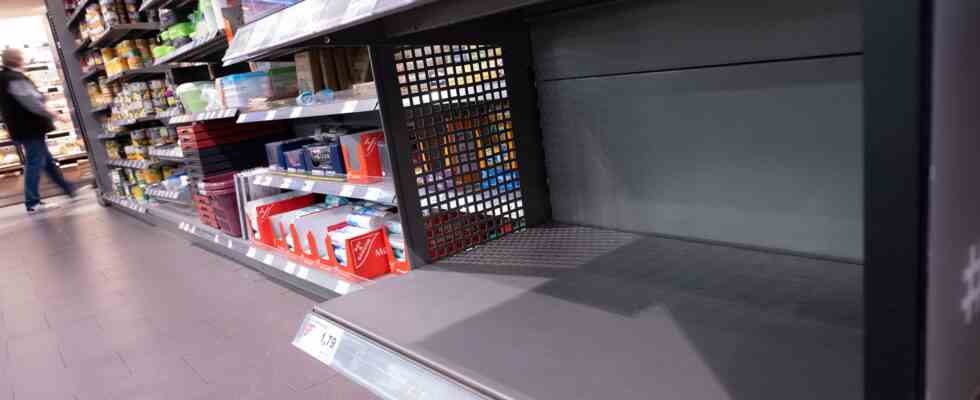Status: 03/18/2022 12:44 p.m
Because of the war in Ukraine, some foods such as sunflower oil and wheat flour are currently missing from supermarket shelves. Hamster buying happens. But are there real supply bottlenecks?
Whether at Aldi, Edeka or Rewe – where the cooking oil is supposed to be in the supermarkets, there is often an empty space at the moment. The cheap sunflower oil in particular is sold out in many places. “Sunflower oil is the new toilet paper,” says a Frankfurt branch manager at Aldi-Süd. At the beginning of the Corona crisis, buying hamsters led to bottlenecks in toilet paper.
Supplies only last for a few weeks
The Association of the Oilseed Processing Industry confirmed to tagesschau.de the acute oil shortage. “Sunflower oil is currently scarce,” said a spokesman. At the moment, remaining stocks from the warehouses are being sold. Stocks will soon run out. “The sunflower oil will only last for a few weeks,” explains the association spokesman.
Because many customers are avoiding, other types of oil are also sold out. The retail chain Real reports a shortage of edible oils. Aldi-Süd is also noticing an increased demand for sunflower, rapeseed and olive oil. Pictures of empty oil shelves are circulating on social media.
Russia and Ukraine as the main suppliers
The “sunflower oil crisis” has a lot to do with the Ukraine war. A good three quarters of global exports of sunflower oil come from Ukraine and Russia. Ukraine alone accounts for half of all exports.
Germany covers 94 percent of its sunflower oil needs with imports. That means: Only six percent comes from domestic production.
fear for the harvest
According to the managing director of Ölmühle C. Thywissen, Detlef Volz, 2.5 million tons of crude sunflower oil were expected from the Ukraine by the next harvest in September. At the moment, however, there are no more ships coming from the Ukraine. Whether there will be deliveries again soon depends on how long the war lasts. Sunflowers are sown in April. It is uncertain whether the fields can be tilled again by then. If the sowing cannot take place, the harvest will also fail.
The supply chains are currently still stable and well stocked, said the Berlin-Brandenburg trade association rbb. Bottlenecks are only to be expected in the coming weeks. Experts emphasize that these could not be compensated for by other importing countries for the time being. In the medium term, the international flow of goods would have to be realigned and evaluated, according to the industry association Ovid.
Markets take action against hamster purchases
The empty shelves with sunflower oil are currently mainly due to hamster purchases. That’s why some supermarkets and discounters have started rationing certain products. In individual Penny branches, such as in Frankfurt, customers are only allowed to take one bottle of oil with them per purchase. Rewe also limits the purchase of sunflower, rapeseed and frying oil. At Aldi-Süd, the limit is four bottles of the house brand.
The industry warns against scaremongering. At the moment there are enough alternatives to sunflower oil. According to the Association of the Oilseed Processing Industry, rapeseed oil and other types of oil are sufficiently available. “There is currently no supply bottleneck for rapeseed oil,” said a spokesman.
No shortage of chips
There are also no bottlenecks for snack items such as crisps. Because the sunflower oil for the snacks came from a different variety that mainly grows in southern Europe, says Thywissen Managing Director Volz.
Experts strongly advise against using the cooking oil as a cheap fuel for your own car. “Vegetable oils lead to starting difficulties and have a negative effect on the performance and service life of the engine,” warns the ADAC. In extreme cases, engine damage could even occur. That would cost the car owner dearly.
Flour is also hoarded
Consumers are currently hoarding not only sunflower oil, but also flour and sometimes pasta. This was observed by the Grain, Milling and Starch Industry Association. Managing Director Peter Habeck sees no reason for such panic buying. The supply of flour in Germany is guaranteed. Enough grain is stored to supply bakeries and supermarkets with flour.
The export ban on Russian grain does not affect Germany. Germany does not import any bread grain from Russia and Ukraine, explains industry association manager Habeck. The degree of self-sufficiency for wheat in Germany is over 100 percent.
The Federal Association of the German Food Trade appeals to the population not to buy in stock. Consumers should show solidarity and only buy commercial quantities. “We are not assuming an undersupply of basic food or everyday necessities,” a spokesman said tagesschau.de. Federal Food Minister Cem Özdemir also sees no reason to buy hamsters. The food supply in Germany is safe.

